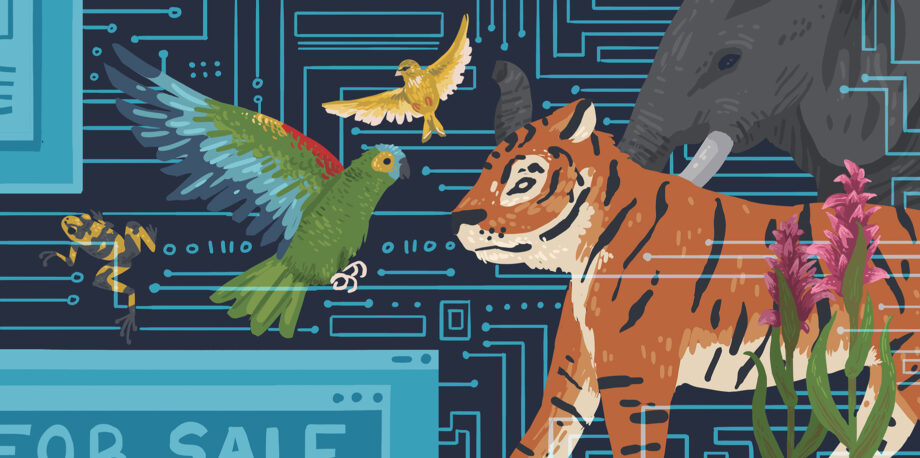July 23, 2019 — In recent months, there’s been a global push to get tech companies to help combat terrorist activities — to make it harder for terrorists to communicate and publicize their heinous attacks online. We need the same kind of resolute effort — led by hackers and savvy computer users — to fight illegal hunting and trading.
All around the world, forests and other ecosystems are falling silent. Their wildlife populations having been decimated to feed burgeoning global markets for ivory, rhino horn, tiger parts, exotic pets and many other wild-animal products.
Much of the illegal trade is happening online. That means that computer-literate folks have an exceptional opportunity to help combat the epic slaughter of Earth’s rarest and most spectacular species by calling out, harassing and disrupting illegal traders.
Online Trading
The trade in illegal wildlife and wildlife parts is estimated to be worth over US$23 billion per year, making it one of the most profitable criminal enterprises in the world. It affects thousands of species — not only elephants and rhinos but big cats, hornbills, orangutans, gorillas, songbirds, sharks, lizards, frogs and rare plants such as orchids.
Most countries have signed up to CITES — the Convention on International Trade in Endangered Species of Wild Fauna and Flora — which makes it illegal to trade in imperiled animals and plants. But illegal trade just keeps growing. A key reason is that the Internet has transformed global markets — allowing consumers to buy almost anything anywhere, while remaining relatively anonymous and communicating across territorial borders with ease. In Thailand, for instance, a recent report by the wildlife group TRAFFIC found 200 wildlife species openly for sale on Facebook — more than half of which are protected by Thai law.
Most of the illegal trade is happening right before our eyes — on legitimate internet-auction sites such as eBay and Alibaba, in classified online ads, and in social-media chat rooms. (Some is superficially masked using code words to sell illegal ivory and other illicit wildlife items.) Hackers and even those with basic computer skills could have a big impact by searching out illegal traders and making the tech companies that own the online sites aware of them — and then pressuring the companies to shut the illegal traders down.
Once they are alerted to the problem, many tech companies are willing to help such efforts. For example, the giant online trader Alibaba recently signed an agreement with TRAFFIC pledging zero tolerance of the illegal wildlife trade. But making such promises is easy. Identifying the bad guys, and pressuring tech companies to make good on their promises to ban them, is the part that takes diligence and determination.
Computer hackers, who often have elite skills, could attack illegal traders in additional ways. While we don’t advocate illegal activity, we would not shed many tears if illicit traders found themselves hamstrung by disruptive strategies that hackers have used effectively in the past.
Heroic Hackers
We need hackers and other computer users to attack illegal wildlife trading — both because the black trade is growing so fast, and because the Internet is so integral to its operation.
Illegal traders can be very difficult to prosecute directly because they must be caught with protected species in their possession to be charged with a crime. And even if convicted, the penalties are often little more than a slap on the wrist.
But by subverting their ability to use the Internet to connect with their buyers, we could make their activities much harder. We don’t have to stop the trade entirely — just throw sand in their gears often enough that it becomes harder and less profitable. That could force many traders out of business. Even those driven onto the Dark Web — where encryption and a lack of searchability is the norm — would find their trade greatly diminished.
Bottom line: The illegal wildlife trade is rated by experts as one of the greatest of all threats to biodiversity. Hackers and other computer users who want to make a difference can play a vital role in helping to save nature and many of our most spectacular species. Let’s do it.
Editor’s note: The views expressed here are those of the authors and not necessarily of Ensia. We present them to further discussion around important topics. We encourage you to respond with a comment below following our commenting guidelines, which can be found on this page. In addition, you might consider submitting a Voices piece of your own. See Ensia’s Contact page for submission guidelines.
Ensia shares solutions-focused stories free of charge through our online magazine and partner media. That means audiences around the world have ready access to stories that can — and do — help them shape a better future. If you value our work, please show your support today.
Yes, I'll support Ensia!



Contact info (e-mail address or webpage) for some of the more well-known sites (e.g. ebay) would help too :)
- Thank-you